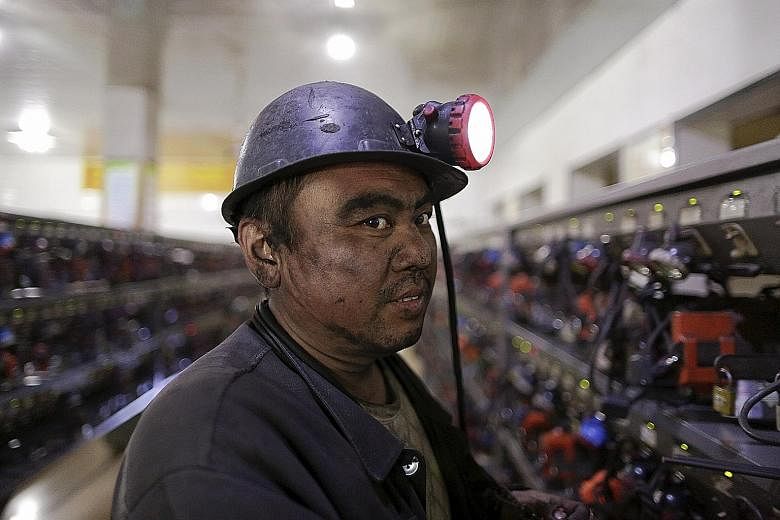HEGANG (China) • In the dank shower room where the miners soak, the coal dust from their bodies staining the water chocolate, a lone worker sat smoking a cigarette, staring at the floor.
He lingered, he explained, because since his pay was cut by half, he had been eating dinner at his parents' apartment and he dreaded the humiliation of going there again.
"If any of the leaders would do their job properly, the situation would not be like this," said the worker, Mr Guo, 39. "If they want to sack me, they should just do it. Can it get any worse?" It probably will.
The mine's owner, the Longmay Group, the biggest coal company in north-eastern China, announced in September that it planned to lay off 100,000 workers. The elimination of about 40 per cent of the workforce at 42 mines in four cities is the biggest reduction in jobs that anyone could recall in this steadily declining rust belt near the Russian border.
China has managed mass layoffs at creaky, state-owned businesses like Longmay before, averting the threat of strikes and unrest by suppressing protests and offering payouts and job training.
But that was when the economy was booming and could readily absorb displaced workers. The test the government now faces in this depressed coal town and in other hard-hit areas across the country is whether it can head off labour discontent in a slowing economy.
Longmay has so far delayed the bulk of the layoffs, cutting only several hundred older workers who held non-essential jobs. Last month, the government of Heilongjiang province, which owns Longmay, announced a US$600 million (S$849 million) bailout that would help the company repay its bonds. But analysts see the infusion as short-term relief that will not prevent the inevitable reckoning.
The coal industry is hurting nationwide, as coal prices have fallen nearly 60 per cent since 2011, said Mr Deng Shun, an analyst at ICIS C1 Energy, a consultancy based in Shanghai. And Longmay, he said, produces far less coal with extra workers than newer, more efficient firms.
"They are quite worried about social unrest, so they delay," he said. "These layoffs should have happened two years ago."
There have already been flashes of discontent. In April, even before the layoffs were announced, thousands marched on the streets of Hegang, a city of about 1 million, to protest against delayed salaries. The organisers were arrested and jailed.
In October, company management stifled a protest by locking workers in the mines. The police patrolled the streets outside the company headquarters on the day the rally was planned.
Of greater concern to the government is the fact that Hegang is not the only place where tensions with workers are increasing. The number of strikes and labour protests nationwide nearly doubled to 2,354 in the first 11 months of this year, compared with 1,207 in the same period last year, according to China Labour Bulletin, a monitoring group based in Hong Kong. The organisation said strikes and worker protests hit a record high of 301 incidents last month.
The reactions of demoralised workers are being watched closely because the staying power of the Communist Party has been linked to its ability to deliver continued economic progress.
The unwritten social compact is that the party delivers growth, jobs and higher living standards, and in exchange, the workers acquiesce to its monopoly on power, surrendering the right to organise unions or protest.
That bargain could unravel if workers no longer believe the government is living up to its end of the bargain.
NEW YORK TIMES

